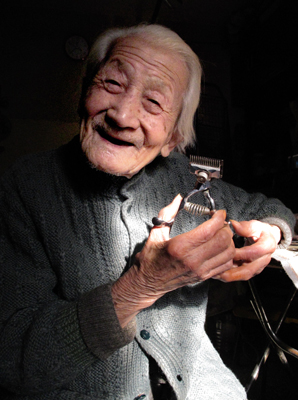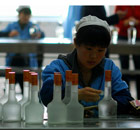Top Biz News
Making the traditional cut
By Sun Li (China Daily)
Updated: 2010-01-28 07:45
 |
Large Medium Small |
|
 |
|
Jing Kui, a 97-year-old barber, at his home in Beijing on Jan 25.[China Daily] |
Through the decades, his mastery of the trade and easygoing manner have helped him meet patriotic military leader Fu Zuoyi and Peking Opera star Mei Lanfang.
In this day of modern salons and flamboyant coiffure, Jing Kui continues to keep the traditional art of the barber alive.
Jing, 97, is one of the country's oldest living barbers and a member of an aging industry fighting to survive the onslaught of modernity.
A widower, father, grandfather and great-grandfather, the Beijinger started learning the trade when he was 15.
In the past decade, Jing has ridden his tricycle to trim hair for his loyal clientele in the city's alleyways. But now, most of his former clients have passed away and his physical condition does not allow him to provide door-to-door services any longer. So people today get their hair cut at his place of work, a crammed room in Gaowo Hutong of Xicheng district in the capital.
"Now, most of my clients are men in their 40s. They will make a phone appointment in case I'm not at home. They are satisfied with my work and they don't mind the old conditions here," Jing said.
In 2006, Jing even played himself as the leading role in Old Barber, a film about the tranquil life of a veteran coiffeur who has more than 80 years of experience and continues to practice his art in Beijing. The film won international acclaim and also brought Jing into the limelight.
"For the past few years, I have been interviewed many times by different news agencies after the film won awards in several international film festivals. I was later filmed by a German director who came to me to make a documentary," Jing said.
"I was even invited to Japan to share my stories of shooting that prize-winning film with Japanese audiences and I had to go for six interviews in one day. Altogether, I did 30 interviews."
There also has been a change in Jing's business after he shot to fame. A number of foreigners, accompanied by their Chinese interpreters, visited the old barber to try getting a haircut.
"Some of them were foreign journalists working in China, who probably got to know about me through the film," Jing said.
"I have already trimmed and shaved for people from Canada, Italy and the Netherlands. We all became good friends. A Canadian guy was so pleased with my cut that he has since treated me in a fancy restaurant to celebrate my birthday every year."
Standing in his simple and small room, Jing riffled hair with a comb and examined its density and flow, before snipping with his antique scissors in a mien that has amazed customers from home and abroad.
Barbering in the country has not been the same since hairdressing become much more fashionable. The once familiar bobbing, shingling and shaving in a barber shop have given way to an operation that sometimes lasts a couple of hours, which includes everything from hair dyeing to a permanent wave, and can cost in the hundreds of yuan.
| ||||
"What the old-fashioned barbers do are more than just traditional cuts. We can perform ear-picking, a skill that can make customers very comfortable and something that is not mastered by those beauticians out there."
One of Jing's customers once told him he was better than the hairstylists in Si Lian, a prestigious hair salon in Beijing. Jing said it was simply because he knew how to design.
According to Jing, a haircut is like an art and the barber a designer. A barber cannot make a beautiful work of art unless he studies his subject first. Depending on the specific head form and facial attributes of each client, a barber may adopt different approaches to cutting. However, many hairstylists are apt to cut without adequate observation and that leads to a number of "unpleasant works".
Asked how long he planned to stand behind the chair, Jing said: "If I retire, my skills may end with me. Because it's dangerous (when it comes to shaving), time-consuming and most importantly, not lucrative, no one wants to learn to do traditional cuts, including my offspring."
"And now I have to take medicine to deal with my stomach problem. I only snip about every 10 days," he said.
"Sometimes I feel sorry if I turn down those who come from afar, so I trim their hair even though I feel some pain."












